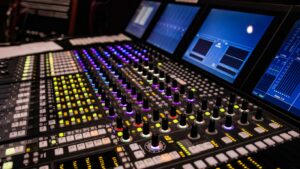In the sonic landscape of the 21st century, the fusion of music and technology has created a symphony of innovation. For those with a passion for rhythm and an interest in cutting-edge tech, a Masters in Music Technology offers the perfect harmony. This degree is not just about composing melodies; it’s about orchestrating the future of sound.
A Masters in Music Technology isn’t a traditional music degree. It’s a blend of creativity and science, where students learn to manipulate sound using the latest technology. From creating immersive audio experiences to designing innovative musical instruments, the possibilities are as boundless as your imagination.
So, if you’re ready to tune into the future of music, let’s explore the captivating world of a Masters in Music Technology. Buckle up for a journey that’s as melodious as it is technologically advanced.
Masters in Music Technology
 Music Technology signifies the junction of sound and science. It’s not purely about producing harmonious tunes, but also about manipulating sound through digital tools. This process includes producing, recording, and editing music, often with high-grade equipment. This branch of knowledge comprises creating immersive audio experiences, designing novel musical instruments, and engrossing into sound engineering. In simpler terms, Music Technology relates to any technology, such as software or hardware, that aids in composing, performing, or recording music.
Music Technology signifies the junction of sound and science. It’s not purely about producing harmonious tunes, but also about manipulating sound through digital tools. This process includes producing, recording, and editing music, often with high-grade equipment. This branch of knowledge comprises creating immersive audio experiences, designing novel musical instruments, and engrossing into sound engineering. In simpler terms, Music Technology relates to any technology, such as software or hardware, that aids in composing, performing, or recording music.
Opting for a Master’s degree in Music Technology opens a plethora of opportunities. Candidates learn to blend traditional music composition techniques with modern technology, transforming audio experiences. An expertise in Music Technology equips individuals with technical knowledge and creative skills. It’s an ideal choice for those yearning to work in industries like entertainment, broadcasting, education, and even software development.
In addition, this degree facilitates understanding of digital audio workstations, synthesizers, and other potential sound sources. Additionally, it exposes candidates to coding for audio applications, empowering them to sculpture their unique musical tools.
Importantly, pursuing a Master Degree in Music Technology offers unique opportunities. Besides traditional careers such as music production or sound engineering, graduates find a place in research teams exploring the outcomes of applying artificial intelligence to music.
Further, as the world embraces technology in every sphere, mastering Music Technology equips candidates with skills to stay abreast in the fast-changing landscape of the music industry.
Core Curriculum and Specializations
 The Master’s in Music Technology program comprises a strategic curriculum that embeds both theoretical knowledge and practical skills necessary in the music industry. Such knowledge forms an unshakeable foundation for music aficionados who aim to leverage technology in their musical pursuits.
The Master’s in Music Technology program comprises a strategic curriculum that embeds both theoretical knowledge and practical skills necessary in the music industry. Such knowledge forms an unshakeable foundation for music aficionados who aim to leverage technology in their musical pursuits.
Music Technology programs often comprise basic and advanced courses to lay a solid foundation and provide a deep dive into specific areas, respectively.
- Music Production Techniques: This course gives students hands-on experience in music production, utilizing digital audio workstations for mixing and mastering sound tracks.
- Audio Engineering: This course focuses on the concepts of sound engineering, such as acoustics, sound design, and audio signal processing.
- Music Information Retrieval: It’s a course aimed at teaching the techniques of extracting information from audio files and understanding music data analysis.
- Interaction Design for Musicians: This course deals with user interfaces for music performance and composition, often focusing on MIDI controllers, interactive music systems, and software.
Each course, as mentioned above, deals with expansive knowledge zones of technology’s impact on music. For instance, Audio engineering illuminates sound engineering concepts including acoustics and sound design; Music Information Retrieval extracts insightful data from music files.
Career Prospects After Graduation
 In the post-graduation landscape, those who’ve successfully completed a Master’s in Music Technology often find broad-reaching career opportunities. A blend of traditional music techniques and innovative tech tools, the program equips graduates with the qualifications that are well-suited in numerous sectors within the dynamic music industry.
In the post-graduation landscape, those who’ve successfully completed a Master’s in Music Technology often find broad-reaching career opportunities. A blend of traditional music techniques and innovative tech tools, the program equips graduates with the qualifications that are well-suited in numerous sectors within the dynamic music industry.
These specializations cater to various domains within the music industry, ensuring students derive the expertise to master their musical journey. Sound Design, for example, gears towards creation and recording of audio elements, while Music Business targets the entrepreneurial aspect, covering areas like marketing and music-law. Thus, each specialization provides essential knowledge and skills catering to core areas within the music technology landscape.

